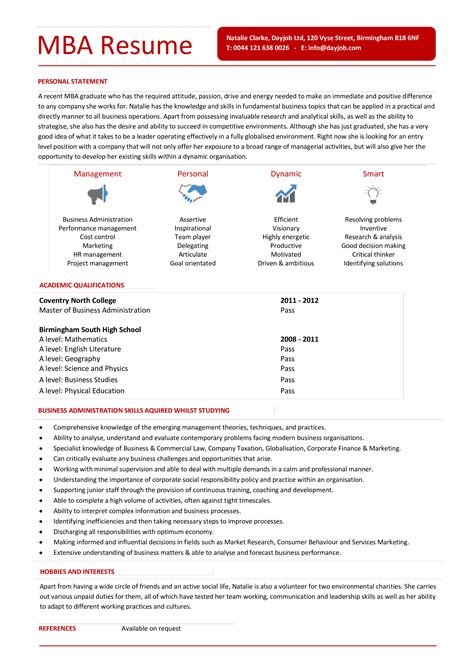Learn MBA Resume Basics, key sections to include, crafting a powerful summary, and highlighting achievements to land your dream job.Are you in the process of creating or updating your MBA resume? A strong resume is crucial in showcasing your skills, experience, and accomplishments to potential employers, especially in the competitive world of business. In this blog post, we will delve into the essential components of a compelling MBA resume and provide valuable tips for crafting a powerful document that effectively highlights your achievements. From the basic structure of an MBA resume to the key sections that should be included, we will cover everything you need to know to make your resume stand out. Whether you’re a recent graduate or a seasoned professional, understanding how to effectively present your MBA credentials on your resume is essential for landing your dream job in the business world. So, let’s dive into the world of resume examples for MBAs and learn how to make your resume shine.
MBA Resume Basics
An MBA resume is a crucial document that showcases your education, experience, and skills to potential employers. When crafting your MBA resume, it’s important to include key sections that will highlight your qualifications and accomplishments. The basics of an MBA resume include your contact information, education, work experience, and relevant skills. These sections provide a comprehensive overview of your background and make it easy for hiring managers to quickly assess your suitability for a job.
Additionally, a powerful summary can be included at the top of your resume to provide a snapshot of your professional profile. This section should emphasize your career goals, expertise, and unique value proposition. Crafting a compelling summary can grab the attention of recruiters and encourage them to keep reading your resume. Furthermore, it’s essential to highlight your MBA achievements throughout your resume. This could include any awards, honors, or special projects you completed during your MBA program. By showcasing your accomplishments, you demonstrate your capability to excel in a professional setting.
Overall, an MBA resume should be well-organized, clear, and concise. It should effectively communicate your qualifications and unique value as a job candidate. By following these basics, you can create a standout MBA resume that will make a positive impression on potential employers.
Key Sections to Include
Key Sections to Include
When crafting your MBA resume, there are several key sections that you should be sure to include. These sections will help to highlight your qualifications and make a strong impression on potential employers. One important section to include is your education background. Be sure to list any degrees or certifications you have earned, as well as the name of the institution and dates attended.
Another vital section to include is your work experience. This is where you can highlight any relevant jobs or internships you have held, along with the responsibilities and accomplishments you achieved in each role. This section will be crucial for demonstrating your practical skills and the impact you have made in previous positions.
Finally, don’t forget to include a section for your skills and achievements. This is where you can showcase any specific skills or accomplishments that are relevant to the MBA position you are applying for. Whether it’s strong leadership abilities, exceptional analytical skills, or significant achievements in previous roles, this section is your chance to demonstrate your unique qualifications.
Crafting a Powerful Summary
When it comes to crafting a powerful summary for your MBA resume, it’s important to focus on highlighting your most significant achievements and skills. Begin by identifying the key strengths and accomplishments that are most relevant to the job you are applying for. This could include leadership experience, project management skills, or specific achievements in your previous roles. Once you have a clear understanding of what sets you apart, you can then craft a concise and impactful summary that effectively communicates your value to potential employers.
Additionally, your summary should also reflect your career goals and aspirations. This is an opportunity to demonstrate how your past experiences align with your future objectives, and why you are a strong fit for the role. By effectively articulating your career trajectory and the value you can bring to the company, you can capture the attention of hiring managers and stand out from other applicants.
Finally, remember to tailor your summary to each job application. This means customizing the language and content to align with the specific requirements and preferences of the hiring company. By doing so, you can ensure that your summary speaks directly to the needs of the employer and positions you as the ideal candidate for the role.
Highlighting MBA Achievements
When it comes to crafting a powerful *resume*, highlighting your MBA achievements is crucial. Potential employers want to see the specific impact you’ve had during your time in business school. One effective way to do this is by using strong action verbs to describe your accomplishments, such as led, managed, or innovated.
Another important aspect of highlighting your MBA achievements is quantifying your successes. Whether it’s increasing revenue, improving efficiency, or implementing a successful project, numbers and percentages can make your accomplishments more impactful to employers. This can help demonstrate the value you can bring to their organization.
Additionally, don’t forget to showcase any leadership roles or team projects you were involved in during your MBA program. Highlighting how you contributed to the success of a group effort can demonstrate your ability to work well with others and lead a team, which are essential skills in the business world.
